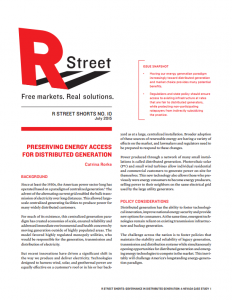Full Title: Preserving Energy Access for Distributed Generation
Author(s): Catrina Rorke
Publisher(s): R Street Institute
Publication Date: July 1, 2015
Full Text: Download Resource
Description (excerpt):
Since at least the 1930s, the American power sector long has operated based on a paradigm of centralized generation.1 The advent of the alternating current grid enabled the bulk transmission of electricity over long distances. This allowed large scale centralized generating facilities to produce power for many widely distributed customers. For much of its existence, this centralized generation paradigm has created economies of scale, ensured reliability and addressed immediate environmental and health concerns by moving generation outside of highly populated areas. The model favored highly regulated monopoly utilities, who would be responsible for the generation, transmission and distribution of electricity.
But recent innovations have driven a significant shift in the way we produce and deliver electricity. Technologies designed to harness wind, solar, and geothermal power are equally effective on a customer’s roof or in his or her back yard as at a large, centralized installation. Broader adoption of these sources of renewable energy are having a variety of effects on the market, and lawmakers and regulators need to be prepared to respond to these changes.
Power produced through a network of many small installations is called distributed generation. Photovoltaic solar (PV) and small wind turbines allow individual residential and commercial customers to generate power on-site for themselves. This new technology also allows those who previously were energy consumers to become energy producers, selling power to their neighbors on the same electrical grid used by the large utility generators.
